Tender and light, with a perfect crust and flaky crumb inside, sourdough blueberry scones are a creative, delicious way to use your starter. An active starter or discard will both work well for this scone recipe. There are instructions in the post for a long fermentation period, as well as making your own self-rising flour.

Welcome to the greatest and last scone recipe you’ll ever need. Namely, sourdough blueberry scones.
These scones are light and fluffy, buttery and subtly sweet. Blueberries are bursting in their soft crumb, and a generous sprinkling of sugar over the top. Let’s dive in, shall we?
What is a Scone?

According to Google, a scone(n.) is “a small unsweetened or lightly sweetened biscuit-like cake made from flour, fat, and milk and sometimes having added fruit.” Scones are a classic British pastry that have become popular all over the world. With their tender, flaky texture and delicious flavor, scones are the perfect treat with a morning cup of coffee or afternoon tea.
The scone’s closest American cousin is the biscuit, and variations on both recipes make them more or less similar. While some scone recipes call for eggs, I opted to go without them, making these scones an easy egg-free pastry.
I adapted Delia Smith’s scone recipe to make sourdough scones. According to experts (a family member from the UK), she’s a respected authority on all recipes authentically British. That seems like a great source for starting things off, no?
Let’s get baking.
Looking for other creative sourdough discard recipes? Click here for a whole list of ideas!
Sourdough Scones Ingredients
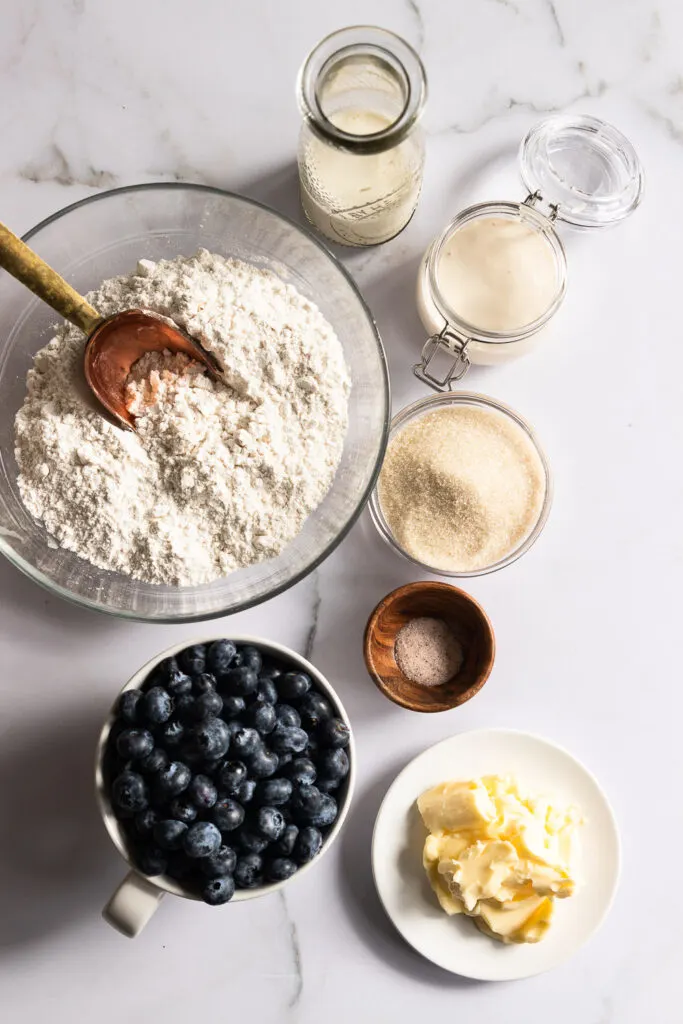
- Self-Rising Flour — self-rising flour has a rising agent (baking powder and some salt) already in it. If you haven’t got any on hand, check the recipe notes section to make your own with all-purpose flour.
- Sugar –I like to use organic cane sugar, and prefer the texture and flavor. It’s usually a coarser grind, so it’s great for sprinkling on top of the scones before baking also. But any granulated sugar will work well.
- Salt — because it makes everything taste better. But just a smidge, because the self-rising flour has some in it already.
- Sourdough Starter — your starter can be active and bubbly, or it can be discard. Whatever you have on hand does the job brilliantly.
- Salted Butter — the butter will be rubbed into the flour, so it needs to be a spreadable consistency, but not too oily.
- Milk — whole milk is best for baking, but any kind of milk will work well for this recipe.
- Whipping Cream — This helps add a bit more fat to the scones, which translates to a moister finished product.
- Blueberries — The amount you use is really up to you. I like about 1 1/2 cups, but 1 is plenty. And whether you want to use fresh or frozen, both are great! I prefer fresh because they don’t have blue ice that colors your dough. But either are a great option, especially if blueberries aren’t in season!
A Note on Ingredients: When baking, I always recommend using a baking scale. It’s an inexpensive way to invest in better baking, especially when it comes to measuring something like sourdough starter. The difference in volume (cups) when using discard is wildly different from the volume of an active starter.
That said, I’ve adapted this recipe for volume (cup) measurements, so you can use those if that’s how you prefer to bake. Your results may be a bit different, but you’ll always end up with a delicious sourdough scone.

How to Make Self-Rising Flour from All-Purpose Flour
If you don’t have self-rising flour on hand and don’t want to run to the market, don’t worry! You can make your own with a little all-purpose flour, some leavening, and salt.
- In a bowl, measure or weigh out 3 3/4 tablespoons or 15 grams of double acting baking powder.
- Add a heaping 1/2 teaspoon or 6 grams of fine ground sea salt or table salt.
- Next, add in 2 1/2 cups or 317 grams all-purpose flour.
- Whisk together well to disperse the baking powder and salt throughout the flour.
- Use your homemade self-rising flour to make fluffy, light scones!
Mixing the Dough
Preheat the oven 425° and line a baking sheet with parchment paper.
Weigh the flour into a large mixing bowl, then add the butter and rub it in with your finger tips. The flour should have a sandy consistency, without any large lumps.
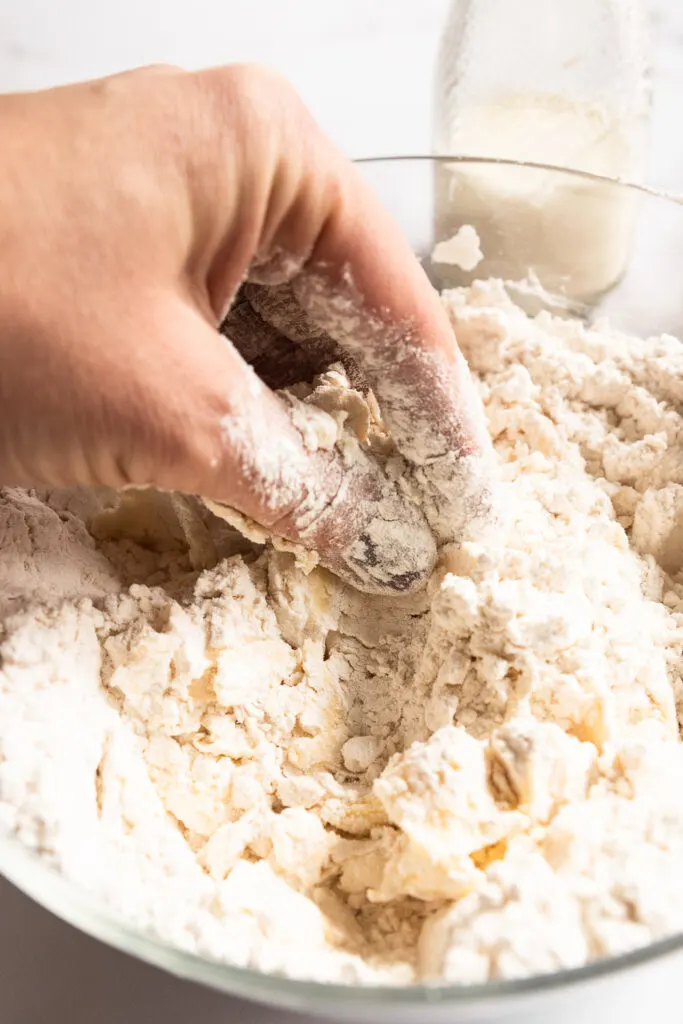
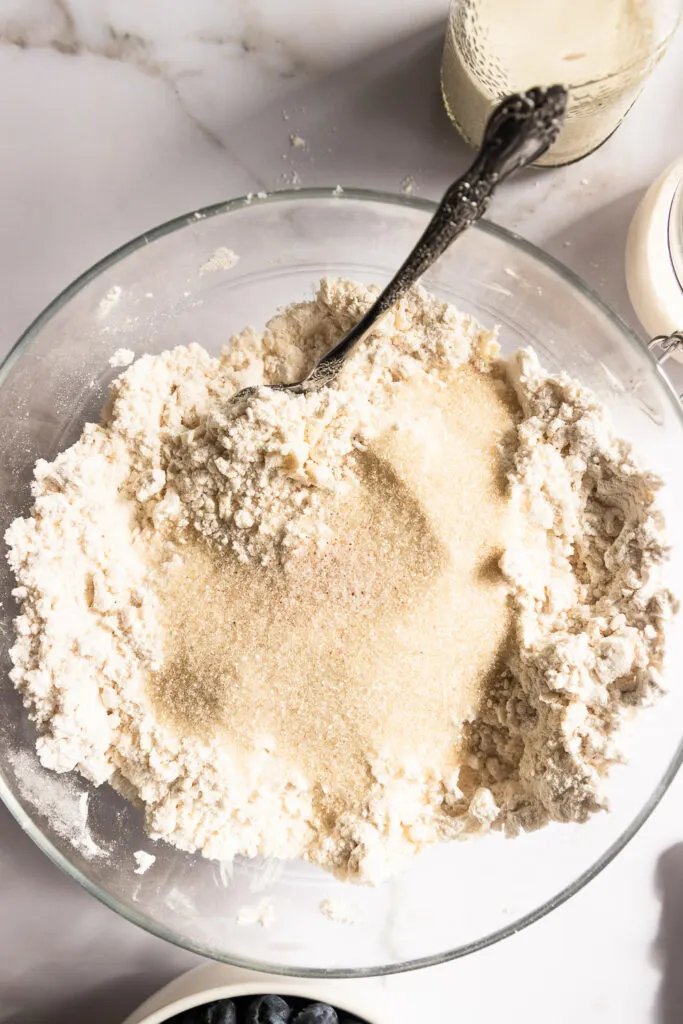
Stir in the sugar and salt until they’re mixed in well.
In a liquid measuring cup, measure out the sourdough starter, milk, and whipping cream. Whisk them to combine, then pour the mixture into the bowl with the dry ingredients.
Use a large fork or wooden spoon to stir the dough together. Combine just until there are no large streaks and clumps of flour left. You don’t want to over-mix, as that can cause the dough to be tough.
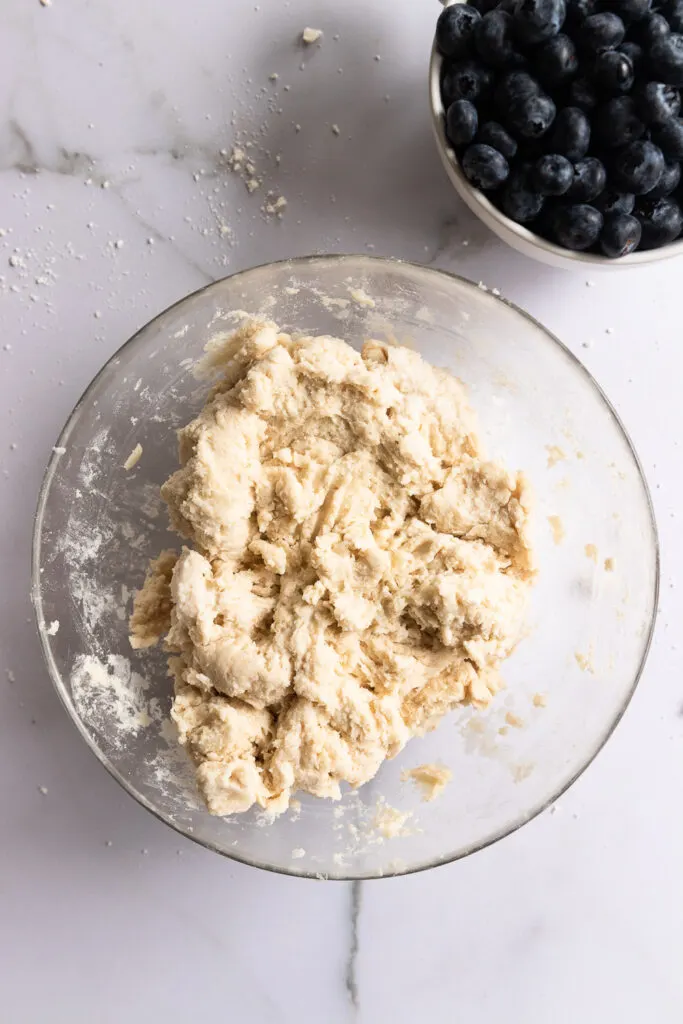
Once the dough is mixed, sprinkle the clean blueberries over the dough, and gently fold them in. Some will burst, but try to keep as many as possible whole to avoid them oozing during baking.
A note on fermenting the scone dough
One of the benefits of sourdough baking is the fermentation, which makes your baked goods easier to digest. However, this fermentation takes time.
If you wish to ferment the scone dough, cut the butter into the flour and sugar. Add the sourdough starter and milk, then stir them into buttery dry ingredients.
Cover the dough and place it in the refrigerator for at least 24 hours. The dough can ferment for up to 3 days, but know that the flavor will change the longer it stays in the fridge. If you leave it any longer, the rising agents in the dough will be ineffective.
When you’re ready to bake the scones, remove the dough from the refrigerator and allow it to come to room temperature. Simply follow the directions below to bake them.
Baking the Sourdough Scones
Dump all of the dough out onto the parchment lined baking sheet. Use your hands or the back of a wooden spoon to spread the dough into a circle about 10″ across and about 1″ high. You can press a few extra blueberries into the top of the scones.
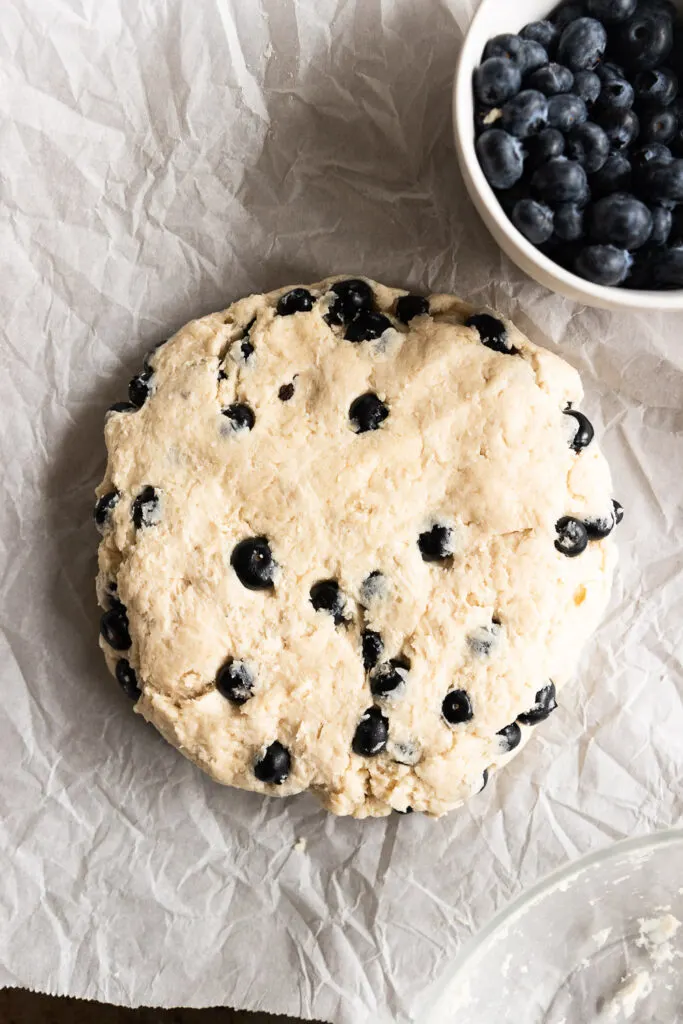
Cut the round of dough into 8ths by cutting it first into halves, then quarters, then eighths. Sprinkle the top generously with 3-4 tablespoons of sugar.
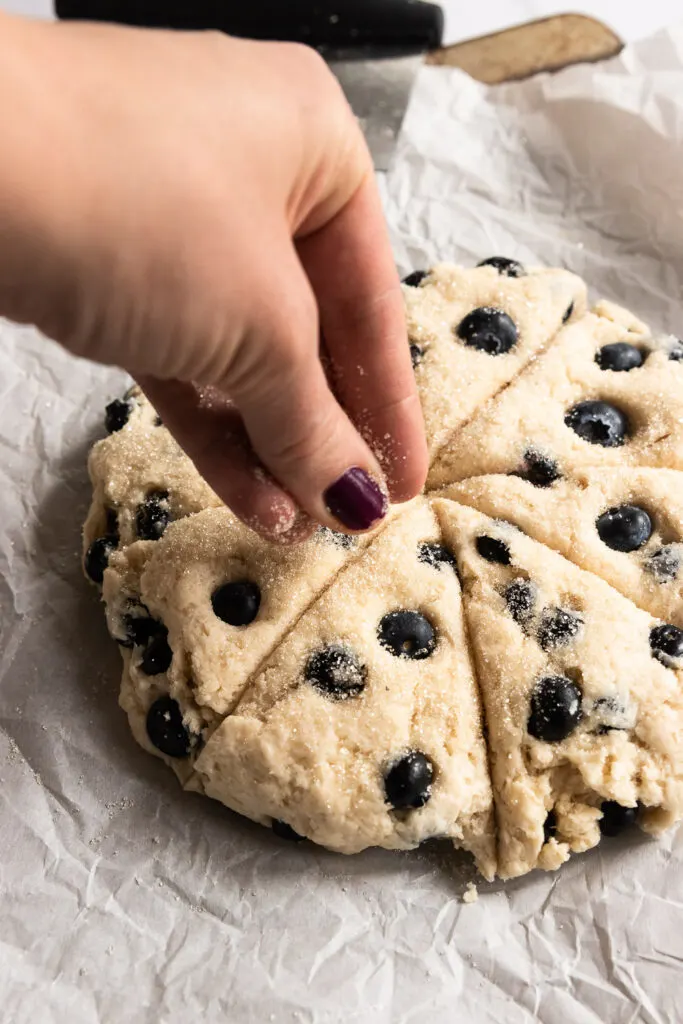

Bake the scones for 24-28 minutes, or until they are golden brown. You can also separate the tips of the scones gently (and just a tiny bit) to peek in between the edges of the scones and make sure that they aren’t doughy in the center.
Remove the scones from the oven, and allow them to cool for 20-30 minutes. They will rise together while baking, so re-cut them before serving.
The Best Way to Store Sourdough Scones
Like most baked goods, scones are best the day they’re made. But if you can’t eat all of them that quickly, store them in an air tight container or bag. Put them away only after they’ve cooled completely, or the warmth will create steam, which will give you soggy scones.
Keep them in a cool, dry place at room temperature. Storing them in the refrigerator can leave you with dry, crumbly scones.
Recipe Notes and Tips
- For tender scones, don’t overmix the dough. Make sure all of the dry ingredients are blended in, but mixing the dough for too long can make the gluten develop and create a tougher, denser scone.
Other Scone Recipes You May Enjoy:
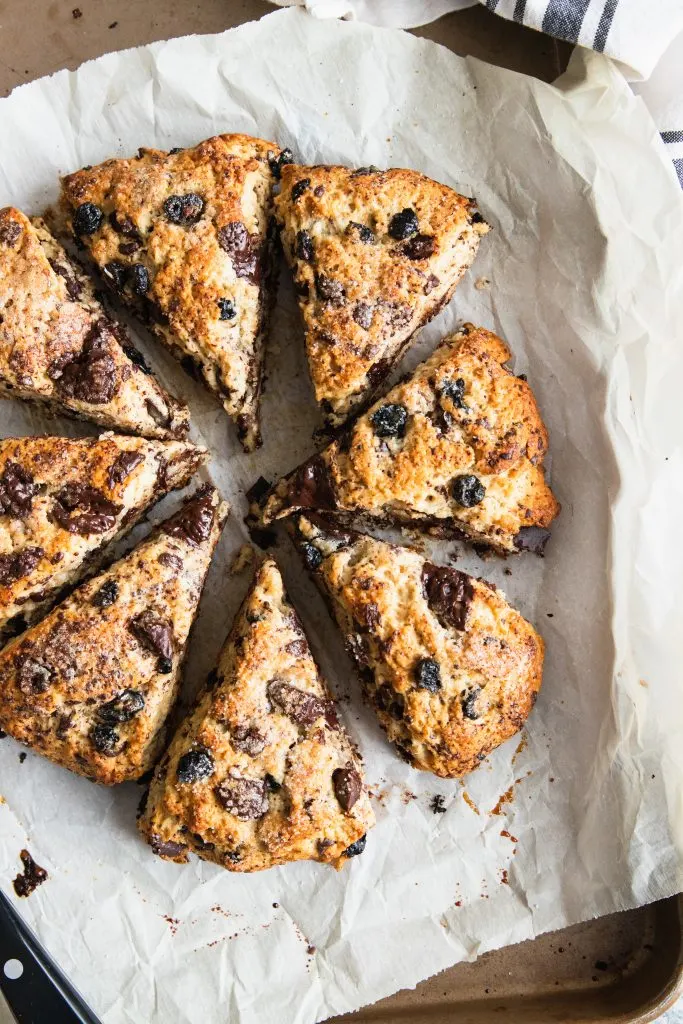

Sourdough Blueberry Scones
- Total Time: 43 minutes
- Yield: 8 large scones 1x
Description
Tender and light, with a perfect crust and flaky crumb inside, sourdough blueberry scones are a creative, delicious way to use your starter. An active starter or discard will both work well for this scone recipe. There are instructions in the post for a long fermentation period.
Ingredients
- 86 grams (6 tablespoons) salted butter, soft but not melted
- 338 grams (2 1/2 cups) self-rising flour (see notes below for how to use all-purpose flour in these scones)
- A pinch of salt
- 100 grams (1/2 cup) granulated sugar, divided
- 97 grams (about 1/2 cup) sourdough discard
- 3 oz. (6 tablespoons) whole milk
- 1 oz. (2 tablespoons) whipping cream
- 6–9 oz. (1–1 1/2 cups) blueberries, fresh or frozen
Instructions
Preheat the oven 425° and line a baking sheet with parchment paper.
Weigh the flour into a large mixing bowl, then add the butter and rub it in with your finger tips. The flour should have a sandy consistency, without any large lumps.
Stir in the sugar and salt until they’re mixed in well.
In a liquid measuring cup, measure out the sourdough starter, milk, and whipping cream. Whisk them to combine, then pour the mixture into the bowl with the dry ingredients.
Use a large fork or wooden spoon to stir the dough together, just until all of the flour is incorporated.
Sprinkle the blueberries over the dough, and gently fold them in. Some will burst, but try to keep as many as possible whole to avoid them oozing during baking.
Dump all of the dough out onto the parchment lined baking sheet. With your hands or the back of a wooden spoon, spread the dough into a circle about 10″ across and about 1″ high.
Cut the round of dough into 8ths by cutting it first into halves, then quarters, then eighths. Sprinkle the top generously with 3-4 tablespoons of sugar.
Bake the scones for 24-28 minutes, or until they are golden brown. Separate the tips of the scones gently (and just a tiny bit) to peek in between the edges of the scones and make sure that they aren’t doughy in the center.
Remove the scones from the oven, and allow them to cool for 20-30 minutes. They will have baked together, so re-cut them before serving.
Notes
How to Make Your Own Self-Rising Flour:
- In a bowl, measure or weigh out 3 3/4 tablespoons or 15 grams of double acting baking powder.
- Add a heaping 1/2 teaspoon or 6 grams of fine ground sea salt or table salt.
- Next, add in 2 1/2 cups or 317 grams all-purpose flour.
- Whisk together well to disperse the baking powder and salt throughout the flour.
- Use your homemade self-rising flour to make fluffy, light scones!
- Prep Time: 15 minutes
- Cook Time: 28 minutes
- Category: Pastries
- Method: Baking
- Cuisine: British

Sourdough Discard Cinnamon Rolls - Good Things Baking Co
Tuesday 1st of October 2024
[…] or a Puff Pastry Cinnamon Sugar Star. If you prefer to keep things strictly sourdough, try Sourdough Blueberry Scones or Sourdough […]
The Best Blueberry Cake Donuts {and Donut Holes} - Good Things Baking Co
Tuesday 23rd of January 2024
[…] Just take a gander at all of the blueberry recipes I have on my site– coffee cake, tarts, scones, cobbler, curd, jammy shortbread bars… I think you get the […]
René van Zyl
Monday 25th of September 2023
Not to be compared with regular scones that have eggs in: more a biscuit than scone. Had to add 2 extra Tbsp milk and baked for an hour before it was done. Very rich flavour, with crispy outside and light crumb